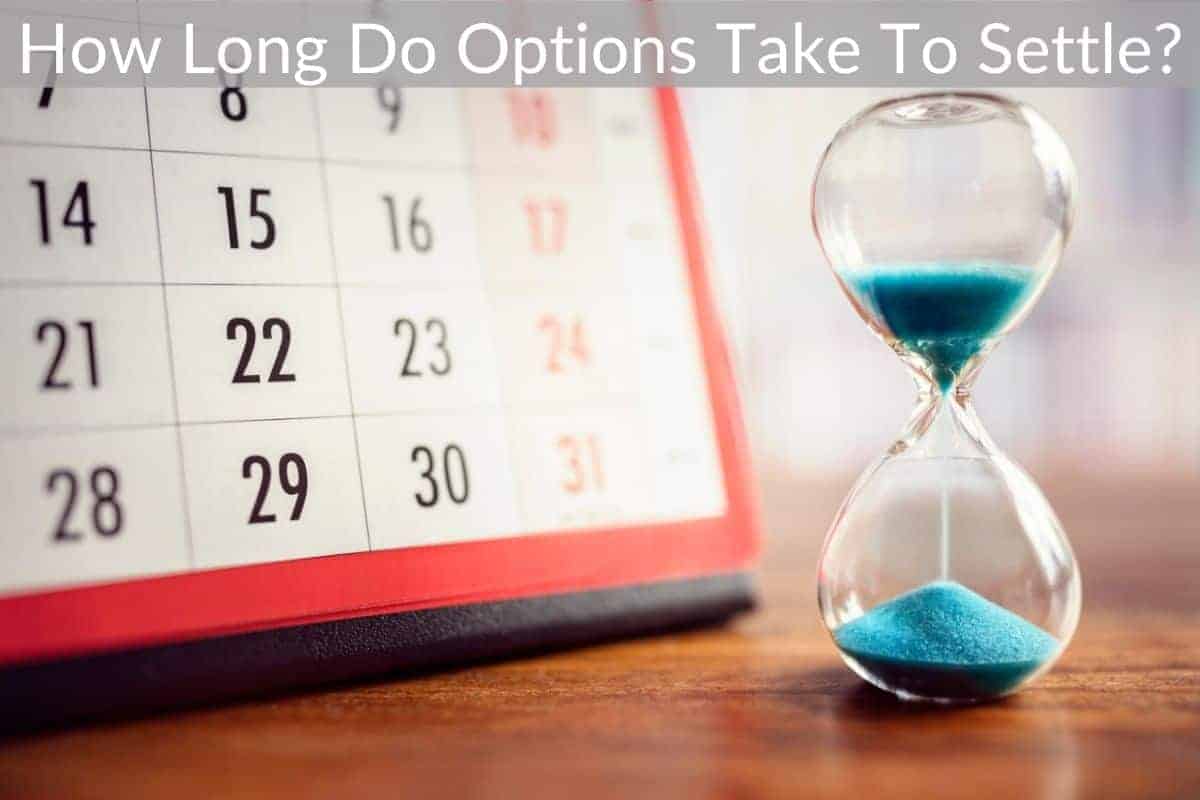Table of Contents
*This post may contain affiliate links. As an Amazon Associate we earn from qualifying purchases.
Options settlement is the process of resolving the terms of the contract between the two relevant parties once it’s exercised or sold. All of this is done automatically through brokerages.
So, how long exactly does it take for options to settle, and when can you use the money again?
Option contracts settle the next business day after being exercised or sold. So if you sell a call/put option you can use the money again on the next business day.
This will be true for all options and with all brokerages so it won’t change from broker to broker. So if you sell an option on Tuesday you will be able to use that money to buy more options (or to withdraw it from your account) on the next business day… Wednesday.
Being able to use those funds the next business day is especially useful for those people who day trade in a cash account (as that allows you to day trade without worrying about breaking the pattern day trader rules). For them it means they could turn over their entire trading account ina single day and then use those same funds to trade options again the next day.
In this article I will try explain everything you need to know about options settlement. Keep reading to learn about the two types of settlements and how they differ from one another.
What An Options Settlement Is And How It Works
Once an option is exercised, there’s a transaction between the two concerned parties. The process of resolving the terms of the options contract between them is called settlement.
The two parties involved in an option settlement are the:
- Option holder (The person who currently owns the option)
- Option writer (The one who sold the options to the holder)
Settlement starts when the option holder pays the writer a sum for the underlying assets at the strike price. In put options, the holder sells the asset to the writer.
This process is handled by a clearing organization which acts as an intermediary between the buyer and seller. Its job is to regulate the transaction and delivery of the instruments, clearing trades, and more.
Thanks to the clearing organization, problems during the transaction between the two parties are eliminated.
The contract no longer exists once the settlement process completes since all contract terms between the two parties are settled.
The Two Ways Options Can Settle
Depending on whether the option contract is exercised or sold to a different party, it can settle in one of two ways:
Physical Settlement
Physical settlement is when there’s a delivery of the underlying assets that the option contract is based on. It’s the most common type of settlement.
It happens when the contract is exercised, resulting in the option holder to buy or sell the underlying assets, depending on whether it’s a call or put option.
In fact, all options traded on the US markets settle physically. This means that you will get the underlying shares of stock in the case of call options, or sell the shares with a put option when you exercise an option.
The advantage of physical settlements is that they allow you to purchase the underlying asset once you exercise the option. However, they are more expensive than cash settlements, which is not ideal if you plan to sell the options without exercising them.
Here is an example of a physical settlement:
Let’s say ABC is trading for $500, and you decide to buy an option for $5.50 ($550 for one contract) that lets you purchase 100 shares of ABC stock with a strike price of $500.
In the following week, ABC starts trading for $530, and you decide to exercise the option and purchase the 100 shares for $500 each. Once you exercise the option, it ceases to exist, and your account is credited with 100 shares of TSLA stock.
Cash Settlement
In cash settlements, there isn’t a delivery of the underlying assets, which means that the option contract is settled with a cash transaction between the two parties.
The paid amount is usually the difference between the strike price and the actual price of the underlying asset. It can also be a fixed amount of cash, depending on the type of traded instruments.
Cash settlements are helpful when it’s challenging to deliver the underlying security. Foreign currencies and commodities are some examples of cash-settled securities.
Cash settlements are a more recent creation and are seldomly used compared to physical settlements.
When cash-settled options expire in the money, the holder of the options gets paid in cash. When the option expires out of the money, there’s no need for a cash transaction since the option becomes worthless.
Here is an example of a cash settlement:
You purchase a put option of XYZ at a $10 premium. The market price of XYZ on the day of purchase was $120. On the settlement date, the price is $130. However, you will still have to sell for $120 according to the contract, resulting in a loss.
In this case, the two parties can decide on a cash settlement. If that happens, you would have to pay the difference of $10, or a total of $1000, to settle the contract.
How Long Does It Take for Options To Settle?
Unlike bonds, stocks, and other securities that trade through a broker, options take less time to settle and typically do so within the same day or the following business day after the trade.
Once any money you get settles into your account, you are free to use it for making other trades or take it out from the account.
For the shorter settlement times, brokerage firms take a deposit from both sides in the trade, called a margin. Brokers use these funds to complete transactions quickly and to cover the risk associated with options contracts.
The date on which an option settles is called the settlement date, which is different from the expiration date when the option expires. However, the two can be the same if the holder exercises the option on the expiration day, which is often the case.
Final Thoughts
Options contracts settle quickly, usually the next business day after the trade. Cash-settled options take two days. Once the money you get from the options settles in your account, you can immediately use it for other purchases or remove it
There are physical and cash settlements when an option contract is exercised.
Physical settlements are the most common. They happen when the underlying assets transfer to or from the holder or buyer.
With cash settlements, the underlying asset doesn’t trade. Instead, there’s a cash transaction between the two parties.

